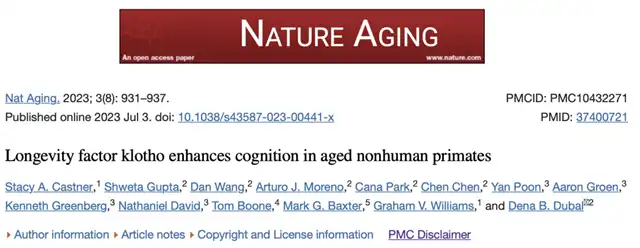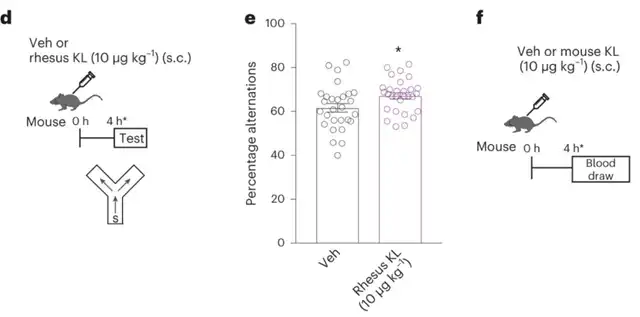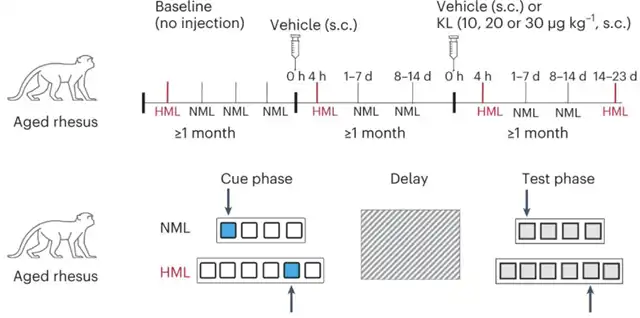Low-Dose Klotho Protein Boosts Cognitive Abilities and Extends Lifespan by 30%
- Normal Liver Cells Found to Promote Cancer Metastasis to the Liver
- Nearly 80% Complete Remission: Breakthrough in ADC Anti-Tumor Treatment
- Vaccination Against Common Diseases May Prevent Dementia!
- New Alzheimer’s Disease (AD) Diagnosis and Staging Criteria
- Breakthrough in Alzheimer’s Disease: New Nasal Spray Halts Cognitive Decline by Targeting Toxic Protein
- Can the Tap Water at the Paris Olympics be Drunk Directly?
Low-Dose Klotho Protein Boosts Cognitive Abilities and Extends Lifespan by 30%
- Should China be held legally responsible for the US’s $18 trillion COVID losses?
- CT Radiation Exposure Linked to Blood Cancer in Children and Adolescents
- FDA has mandated a top-level black box warning for all marketed CAR-T therapies
- Can people with high blood pressure eat peanuts?
- What is the difference between dopamine and dobutamine?
- How long can the patient live after heart stent surgery?
Low-Dose Klotho Protein Boosts Cognitive Abilities and Extends Lifespan by 30%
Supplementing Low Doses of Longevity Protein Klotho Enhances Cognitive Abilities and Extends Lifespan by 30%
Aging, an inevitable aspect of life, has long been a subject of concern. From the moment of birth, individuals embark on a journey marked by the inevitability of aging.
Aging goes beyond the mere accumulation of years; it reflects profound physiological changes in the body, encompassing organ decline and an increase in various diseases. This is a significant reason why aging is a feared phenomenon among humans. Aging itself may not be frightening, but the cascading effects it brings are cause for concern.
Enter the perennial quest for “slowing down aging”: from ancient aspirations for immortality to contemporary scientific explorations of the mysteries of aging, humanity has continuously sought to unravel this intricate process.
In a serendipitous discovery, scientists stumbled upon a gene, Klotho, which appears closely linked to longevity. Mouse experiments revealed that overexpressing Klotho extended the lifespan of male mice by 30.8% and female mice by 19.0%, while knocking out Klotho shortened the lifespan of mice by 80%. This gene, dubbed the “lifeline of human existence,” was named after Clotho, one of the three Fates in Greek mythology.
Since its discovery in 1997, the “longevity protein” Klotho has garnered attention. Located on the 13th chromosome in humans, the Klotho gene plays diverse roles in physiological activities, such as inhibiting oxidative stress and inflammation, reducing endothelial dysfunction, and atherosclerosis. It is closely associated with the maturation of oligodendrocytes and myelin sheath development and is strongly linked to aging, decreasing with age.
Given that Klotho levels decrease with aging, researchers from the University of California, San Francisco, opened a new avenue—supplementing Klotho could be effective! Their study found that a single low-dose administration of the longevity factor Klotho (KL) could effectively enhance cognitive abilities in aged non-human primates, potentially paving the way for treating cognitive decline in the elderly.
Previous mouse studies demonstrated that elevating KL through transgenic overexpression or acute peripheral administration effectively improved cognitive function. Systemically increasing KL in mice enhanced synaptic plasticity, cognitive abilities, and recovery from toxicity related to aging, Alzheimer’s disease, and Parkinson’s disease.

DOI: 10.1038/s43587-023-00441-x
However, mice and humans differ significantly. To apply KL treatment to humans, considering the complexity of the brain’s genetics, anatomy, and function, experiments on non-human primates were crucial to fill the gap.
To overcome the limitations of mouse models, researchers chose rhesus monkeys, which share a 93% similarity in developmental systems with humans. Similar to humans, rhesus monkeys experience age-related cognitive decline, synaptic changes, and damage to brain regions like the hippocampus and prefrontal cortex.
Constructing a rhesus monkey model, researchers attempted to elevate serum KL levels to those seen during human lifespan and investigated whether this dosage could effectively enhance cognitive abilities.
Before conducting experiments on the “heavyweight” rhesus monkeys, further confirmation was needed using mouse models. In the initial step, researchers created a rhesus monkey version of KL protein (with 96% homology to human KL) and tested its effectiveness in mouse models.
Mouse experiments revealed that peripheral administration of low-dose (10 μg/kg) rhesus monkey KL enhanced long-term potentiation (LTP), closely related to synaptic plasticity. Simultaneously, mice exhibited significantly improved working memory in the Y-maze.

Cognitive changes after administration of KL to mice
It was observed that after treating mice with 10 μg/kg KL protein, peripheral KL levels increased approximately sixfold. Based on the positive results and dosage levels from mouse experiments, researchers injected rhesus monkeys with 10 μg/kg KL protein. Compared to the control group, aged rhesus monkeys showed a significant fivefold increase in serum KL levels after the injection, validating 10 μg/kg as the lowest effective dose.
After a single KL injection, researchers evaluated cognitive changes in rhesus monkeys using the Spatial Delayed Response task. The results were astonishing! Monkeys receiving 10 μg/kg KL protein demonstrated enhanced cognitive abilities in both simple (NML) and more challenging (HML) tasks, surpassing the control group significantly. Importantly, KL protein induced more substantial changes in HML testing, possibly due to the increased difficulty and sensitivity of HML.
Moreover, the effects of KL protein were rapid and long-lasting. Just four hours after injection, rhesus monkeys showed a significant improvement in HML scores, persisting for at least two weeks. Similar results were observed in NML testing, consistent with mouse experiments.
In contrast to mouse experiments, higher doses (20 and 30 μg/kg KL) did not improve NML and HML task performance in rhesus monkeys, indicating that high doses could not enhance cognitive abilities in primates. Researchers speculated that the structural and network complexity of the monkey brain surpasses that of mice, accounting for the difference.

Changes in rhesus monkeys after injection of KL protein
In summary, injecting a low dose (10 μg/kg) of KL protein effectively enhanced cognitive abilities in aged rhesus monkeys, with this effect persisting for at least two weeks in NML and HML memory tests. In other words, KL-mediated cognitive enhancement is not limited to rodents but extends to non-human primates highly similar to humans, laying the groundwork for future human trials.
Researchers emphasize that KL has multiple effects, such as acting on insulin and FGF signals, Wnt and NMDAR functions, among others. Low-dose KL exerts a balanced, multi-modal effect across signaling systems, favoring the biological matrix of cognition and enhancing cognitive abilities.
The results of mouse and rhesus monkey experiments provide researchers with significant hope. As lead author Dubal stated, “Now we have ample reason to enter the clinical trial phase!” We look forward to the future, where the “lifeline-grasping” Klotho protein unleashes more of its potential, allowing methods for “aging gracefully” to be applied to humans, eliminating the fear of aging.
Low-Dose Klotho Protein Boosts Cognitive Abilities and Extends Lifespan by 30%
References:
[1] Castner SA, Gupta S, Wang D, Moreno AJ, Park C, Chen C, Poon Y, Groen A, Greenberg K, David N, Boone T, Baxter MG, Williams GV, Dubal DB. Longevity factor klotho enhances cognition in aged nonhuman primates. Nat Aging. 2023 Aug;3(8):931-937. doi: 10.1038/s43587-023-00441-x. Epub 2023 Jul 3. PMID: 37400721; PMCID: PMC10432271.
(source:internet, reference only)
Disclaimer of medicaltrend.org
Important Note: The information provided is for informational purposes only and should not be considered as medical advice.



